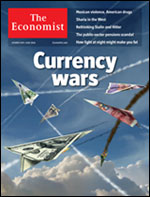Some quick links on the flash crash, China’s rare earth elements monopoly, Larry Summers, and economics at UCSD.
Monthly Archives: October 2010
The Chamber of Commerce Is the International Cosmopolitan Elite
Not that there’s anything wrong with that!
I have been pondering two seemingly separate issues — the first, what constitutes an “elite”. David Brooks says it’s bobos; Charles Murray says it’s those who “…spend school with people who are mostly just like them — which might not be so bad, except that so many of them have been ensconced in affluent suburbs from birth and have never been outside the bubble of privilege. Few of them grew up in the small cities, towns or rural areas where more than a third of all Americans still live.” Personally, I always thought American elites were football players and the folks highlighted on Entertainment Tonight, given the amount of attention devoted to those two groups. (See other recent commentary here) The second, as a social scientist, what interests should one expect the U.S. Chamber of Commerce to be lobbying for [1] (since we do not have direct observation on the funding of the group, we need to infer the interests). I have come to a single answer that partly addresses both of these two questions:
Another disappointing GDP report
The U.S. economy managed to keep growing in the third quarter, but well below what’s needed for a normal economic recovery.
A Post-Mortem on the Fall and Rise in World Trade
And Implications for US Exports
Nearly two years ago, I noted the collapse in world trade, and observed that various explanations for the decline ranged from the drying up of trade financing, to amplification due to vertical specialization, to the composition effect (the fact that durables are over-represented in trade relative to GDP).
Negative real interest rates
What message should we take from negative real interest rates?
Guest Contribution: The ageing, crisis-prone, welfare state is bad news for welfare migration
By Assaf Razin
Today, we’re fortunate to have Assaf Razin, Friedman Professor of International Economics at Cornell University, and Professor Emeritus at Tel Aviv University, as a Guest Contributor.
ARRA’s Impact: The Kauffman Survey
From the just-released Kauffman Economic Outlook, authored by Tim Kane, an indicator of what some economists thought the ARRA accomplished, in terms of unemployment.
Richard Clarida’s retrospective on the financial crisis
I earlier discussed several of the presentations at the monetary policy conference at the Federal Reserve Bank of Boston last week. But missed in the popular coverage of the conference was an insightful discussion by Columbia Professor Richard Clarida that expressed very nicely the conclusions that I have come to as well on the events that led us into these problems.
Currency Wars and (Macro) Competitiveness
With the cover page of the Economist [1] [2] worrying about currency wars, and various analysts arguing whether the US can or cannot win such a “war” (see Naked Capitalism for a discussion), I thought it would be useful to see where we now stand, in terms of “competitiveness”, as understood by open economy macroeconomists.
Arguments against QE2
Having earlier reviewed some of the reasons in favor of additional quantitative easing (QE2), I’d like to acknowledge some of the dissenting views.
